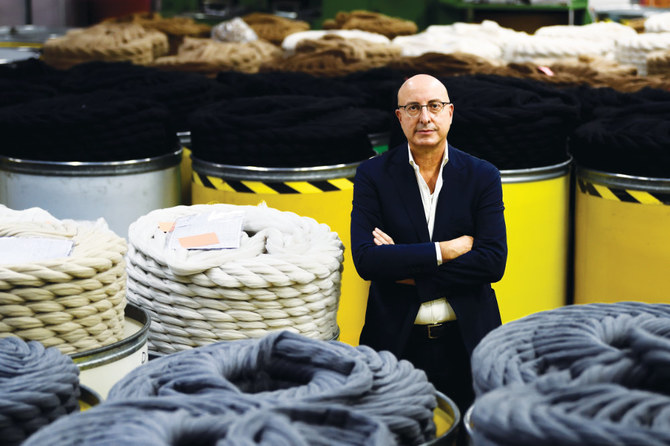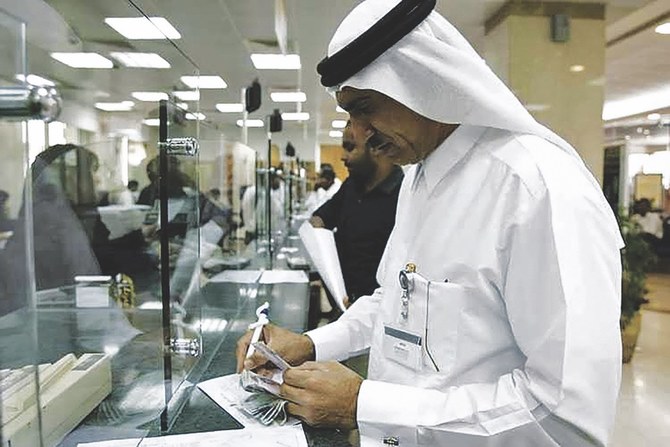MILAN, Italy: Italian luxury designer Brunello Cucinelli makes men’s suits that sell for up to €7,000 ($8,200). But even he — like most people across the globe — hasn’t worn a suit for months, let alone bought one.
“We’ve all been locked away at home, so this is the first jacket I have put on since March,” Cucinelli said as he presented his latest collection in Milan in September, wearing a light grey blazer.
Most people in “white-collar” jobs are working from home, with a newfound love of sweatpants, a trend that some experts expect to outlive the pandemic. And few, if any, weddings or parties are taking place. This seismic shift in behavior is having profound repercussions across the supply chain for suits and formal wear, upending a sartorial sector spanning every continent.
In Australia, the world’s biggest producer of merino wool, prices have been in freefall, hitting decade lows. Many sheep farmers are in dire straits, storing wool in every available shed in the hope of a rebound.
In northern Italy, the wool mills that buy from the farmers and weave the fabric for high-end suits have seen their own orders from retailers nosedive. In the US and Europe, several retail chains specializing in business attire such as Men’s Wearhouse, Brooks Brothers and TM Lewin have closed stores or filed for bankruptcy over the past few months, and more could follow.
Players at all levels said they were being forced to adapt to survive, from farmers turning to other forms of agriculture to mills making stretchier fabrics for a new breed of suits that do not crease easily and are more resistant to stains.
“People want to be more comfortable and are less inclined to wear a formal suit,” said Silvio Botto Poala, managing director of Lanificio Botto Giuseppe, a wool mill in Italy’s textile hub of Biella which counts Armani, Max Mara, Ralph Lauren and Hermes among its customers.
HIGHLIGHTS
•uits out, sweatpants in as millions work from home.
Officewear retailers close stores, file for bankruptcy.
Italians wool mills supplying them see orders evaporate.
Wool prices dive, Australian merino farmers in dire straits.
WFH era begets new breed of stretchy, non-crease suits.
“With Zoom conferences and smart working, you’ll see men wearing a shirt, perhaps even a tie, but not many suits.”
Fine wool prices in Australia have more than halved during a tumultuous 18-month period, as usually healthy purchases of merino wool from Italian mills have almost ground to a halt.
The benchmark price for merino wool fell to A$8.58 ($6.1) per kg in early September, auction results show, down from A$20.16 in early 2019. It has since partly recovered to just over A$10.
Andrew Blanch, managing director of New England Wool in New South Wales, which sources wool from farms for Italian textile makers, said that many buyers now had excess supplies.
“They’ve all got wool to get rid of before they even come back to the market here,” said Blanch, speaking on the phone from wool auctions in Sydney’s western suburbs. “If the shops aren’t open, everything just backs up. A lot of the orders we had bought wool against just got canceled by their clients in the US and around Europe.”
He said that China, which alongside Italy purchases most of Australia’s more than A$3 billion in annual wool exports, was now “the only show in town” even though Chinese buyers were also acquiring less wool. Many merino sheep farmers are storing their wool in sheds or storage facilities; though some who are still emerging from a three-year drought are selling their bales into a weak market to stay financially afloat.
“Not everyone is big enough to hold on to their wool clip and wait for the price to change,” said Dave Young, a farmer near the New South Wales town of Yass. “We are in the position where we have to meet the market within a relatively short time after shearing.”
Young, who has about 4,500 sheep on his property, said that he had refocused some operations to provide lamb meat instead.
A jump up the food chain to northern Italy, and Botto Poala expects his mill’s sales to fall by 25 percent from €63 million last year and that they will take two to three years to recover. However his business is insulated to a degree because it mostly makes womenswear fabric; others are more pessimistic.
“For some businesses, we are talking a 50-80 percent plunge in sales,” said Ettore Piacenza, general manager of the Fratelli Piacenza wool mill, a centuries-old family business with an annual turnover of €52 million. He also heads the wool mills department of the local business association.
Botto Poala said that more than 50 percent of his mill’s turnover now comes from wool that has been made stretchier by treating it in a particular way or having lycra added to it. This is because whatever demand is left for suits, it is more likely to be for fabrics that are more resistant to stains and don’t crease easily, while such cloth can also be used for casual wear, wool mills say.
Italian luxury label Etro, for example, has just launched a “24-hour jacket” made of jersey and mixing wool and cotton.
A gradual move toward casual wear has been going on for years. In 2019, even Goldman Sachs — a bastion of bespoke suits — relaxed the dress code for its staff. Not to mention the rise of the Silicon Valley hipster crowd.
But COVID has turbocharged that shift — boosting sales of comfort clothing and sportswear at the expense of business attire.
In the second quarter of this year, when much of the world was in lockdown, Nike was the hottest brand according to Lyst, a global fashion search platform that analyzes the behavior of more than nine million online shoppers a month.
It was the first time since the Lyst Index began that a luxury fashion brand did not take the top spot.
Gap’s Athleta unit, which sells tights, jogging pants, sweats and workout tops, was its best-performing fashion line in the three months to Aug. 1.
Meanwhile, suits ranked among the highest-discounted and lowest-selling items in France, Italy and Germany in September, according to data compiled by StyleSage.


















